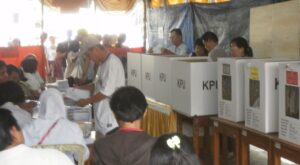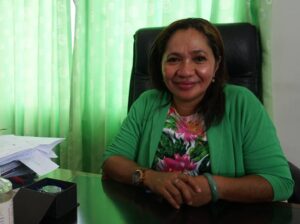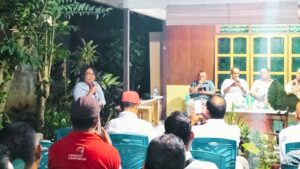
The 2019 General Election was the most complicated direct voting for Budi Santoso. The secretary of the local poll administrator team (KPPS) of Polling Station (TPS) 30 in Bojong Rawa Lumbu subdistrict, Bekasi, had to handle five elections within one day.
The five elections were conducted to elect the president and vice president, members of the House of Representatives (DPR), members of the regional council (DPRD) at the provincial and the municipal/regent level, and members of the Regional Representatives Council (DPD).
“I was physically exhausted, so was my mind. It’s not easy when our mind is drained, because we can’t cure it simply by drinking coffee,” the 47-year-old man told Jaring on Monday, March 29, 2020.
Budi said that local poll administrators had to handle a huge workload amidst a very limited time set by the General Election Commission (KPU). This condition, he emphasized, was the reason behind many human errors during the vote recapitulation. Tragically, the chairman of the TPS 30 at that time, Ismantara, died due to the exhaustion. Ismantara was one of the 894 poll administrators who died during the election round.
[irp posts=”10057″ name=”Displaced because of the Junta”]
“I hope that in the next election, poll administrators would not face this much workload. We also have other work to do. If it’s possible, there should be a pause between each voting, or, maybe the election commission should consider separating the elections based on the level–national, provincial and municipal,” he said.
The government and the House of Representatives have decided that the upcoming 2024 elections will still be held simultaneously in accordance with the mandate of the 2017 Election Law. This decision was agreed upon after the House’s Legislative Body revoked the law from the list of the 2021 national priority legislation program (Prolegnas). In other words, the 2022 and 2023 regional elections (Pilkada) will not be held.
Quoted from the presidentri.go.id page, Minister of State Secretary, Pratikno, emphasized that the government had no plan to revise the Election Law and the Regional Election Law. “The government does not want to revise these two laws, because the laws should not be changed often and bit by bit. We should implement the laws that are already good. I think the Law No.7 of 2017 on Election has been successfully implemented. Even if there is a shortage of small things in the implementation, the election commission can regulate it by issuing a decree,” said the State Secretary on Tuesday, February 16, 2021.
Responding to this decision, the General Election Commission had anticipated the impact of the 2019 Election so that it would not happen again in 2024. According to commission member, Hasyim Ashari, the commission had four priorities in preparing the 2024 General Election.
The first one is institutional evaluation, preparing regulations, strengthening information technology infrastructure and public information disclosure. In terms of institutions, he said, the KPU would improve facilities and infrastructure in order to ensure the health of voting officers.
[irp posts=”9924″ name=”Matters related to health equipment procurement for the 2020 regional elections”]
“There is no health insurance, either in the selection process for prospective ad-hoc members or when performing their duties, despite the plan to hold the general election and regional election simultaneously in 2024,” he said when contacted on Saturday, March 27, 2021. This means that local poll administrators would be overworked like in 2019.
In accordance with Article 201 paragraph (8) of the Law on Regional Elections, the Regional Head Elections will be held in November 2024. In fact, the election should have been completed before the presidential tenure expires in October in the same year.
Therefore, the election commission needs to prepare more ad-hoc committees than in the previous Election. In the 2019 General Election, the number of ad hoc committees reached 5,966,243 people and the number of the committee members reached 2,552,550 people. However, it is not easy to find people who can be on the voting committee. “When implementing it in the regions, the needs [of lower level administrators] and the enthusiasm are sometimes unbalanced, especially regarding educational requirements,” said Hasyim.
In addition, the election commission should ensure the availability of all the needed goods during the voting, including the ballot boxes, the ballot papers, as well as other supporting equipment, such as the thermometer, masks, hand sanitizers and hazmat suits. All equipment should be prepared because nobody knows how long the Covid-19 pandemic will last. “The production capacity in each region varies. We need to anticipate this,” Hasyim said.
To overcome these obstacles, the election commission plans to start preparations for voting earlier. According to I Dewa Kade Wiarsa Raka Sandi, another member of the commission, it would need at least 25 to 30 months to prepare. This means that it is about 5 to 10 months longer than the preparation for the previous election.
“The preparation is important to enter the phases of the election, so that the public and the stakeholders can officially get themselves ready,” said Dewa when contacted on Friday, March 26, 2021.
[irp posts=”9805″ name=”Datatalk.asia pushes for data journalism to battle against public lies”]
He said that if the voting is held between February 14 or March 9, 2024, the preparation could begin in July 2022. As for the regional election scheduled for November 2024, the preparation would start in December 2023. With this plan, the election commission will have more time to review and prepare simulations for the simultaneous voting.
Even so, Dewa said, there had been no certainty regarding the voting schedule until now. In the working meeting of the House of Representatives’ Commission II on Monday, March 15, the election commission was asked to prepare a detailed study and a simulation of schedule, as well as the total budget requirements.
The commission estimated that the budget requirement for the 2024 election would be around Rp 86.2 trillion for the general election and Rp 26 trillion for the 2024 regional election. This figure is the total amount of the budget ceiling received by the commission in the period of 2021 to 2025.
Dewa stated that this year, the budget requested by the commission is Rp. 8.4 trillion. The amount of budget will gradually increase each year with the following details: Rp 13.2 trillion for next year, Rp 24.9 trillion for 2023, and Rp 36.5 trillion for 2024. As for the last phase, the budget is estimated to be Rp 3 trillion, which can be disbursed in 2025. “We still have enough time to formulate the details in each available design,” he said.
Dewa added that the election commission was drafting regulations to ease the burden of the election field officers, including the use of information technology. The commission is developing an application that enables electronic recapitulation. The drafting of these regulations is important so as to provide a legal basis for the use of the information technology.
[irp posts=”9802″ name=”Anti-coup protests in Myanmar intensify”]
“Whenever the election commission needs to adjust several things in the Law, we hope that the government and the House can expedite it through limited revision and the issuance of a government regulation in lieu of law (Perppu),” Dewa added.
Meanwhile, the Director General of Politics and General Government of the Ministry of Home Affairs, Bahtiar, said that the election commission could innovate without having to make changes to the Laws.
He suggested the commission refer to Law No. 14 of 2008 concerning Disclosure of Public Information and Presidential Regulation Number 95 of 2018 concerning Electronic-Based Government Systems (SPBE). “So, seeing the law does not have to be an sich in the Election Law,” he said when contacted on Tuesday, March 30, 2020.
Several other innovations, according to Bahtiar, could also be regulated through the election commission’s technical regulations such as simplifying forms, voting and counting methods, to methods of dissemination of information. Furthermore, the regulation will be consulted with Commission II of the House of Representatives and the Ministry of Home Affairs to become a collective agreement.
[irp posts=”9824″ name=”Indonesian voters still tend to be permissive of money politics”]
Chairman of Commission II, Ahmad Doli Kurniawan, shared the same opinion. According to him, the election commission needed to prepare a legal basis in detail, both regarding the use of information technology and related to the simplification of the voting stages. After that, the study should be finalized through a joint working team between the election commission, the election supervisory body (Bawaslu), Commission II of the House of Representatives and the Ministry of Home Affairs.
“In terms of technical regulations, any regulations needed to support the concept of the planned election can be proposed immediately. For example, from now on we have a design for the draft of regulation of the election commission and the supervisory body, “he said in a joint working meeting with the Ministry of Home Affairs and election commission on March 15, 2021.
Hadar Nafis Gumay, a senior researcher for the Network for Democracy and Elections with Integrity, warned the election commission to have the courage to take the initiative to simplify the stages of the upcoming 2024 election. One of them is by cutting the data collection process of the voter lists (DPT). He said the election commission could make use of the list prepared for the regional election to be held in early 2024.
Another thing that he suggested was simplifying the design of the ballot papers. According to him, the commission should make simpler ballots in order to ease the voters to understand. In addition, this simplification can also minimize logistics problems. “If the commission cannot simplify the process, I think it is obvious that we will be facing the same situation as in the 2019 election,” Hadar emphasized.







